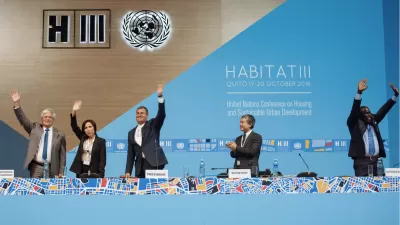As part of Human Settlements Day at COP-23 on November 11, Planners for Climate Action will feature representatives of professional planners associations and planning school associations worldwide.

Planners for Climate Action will launch at COP-23 in Bonn as a stakeholder group under the Marrakesh Partnership in the UN Framework Convention on Climate Change (UNFCCC). Planners for Climate Action will be part of Human Settlements Day on November 11 at COP-23, beginning at 11:30 am in the Davos Room, Bonn Zone.
Cities emit a significant portion of the world's greenhouse gases while providing homes to concentrated populations that are highly vulnerable to the impacts of climate change. Over the past decade or so, sub-national governments have been rising in visibility in the UN climate discussions. At the 2014 Ban Ki-moon Climate Summit several new stakeholder groups reflecting government perspectives were added. The 2015 Paris Agreement explicitly mentions "cities and subnational authorities" as one type of non-Party stakeholder that is invited to "scale up" its efforts.
Urban and regional planners have a key role to play in helping cities address climate change. Compact urban development patterns may make public transportation more viable, leading to reduced greenhouse gas emissions; meanwhile in the long-term land use controls will profoundly affect the exposure of vulnerable populations to climate-related natural hazards such as flooding and landslides. The role of city and regional planners and plans in addressing climate change is made explicit in the 2030 Agenda for Sustainable Development as well as in the New Urban Agenda. Despite this, city planners and their organizations have been outside the purview of the UNFCCC Marrakesh Partnership. This step forward will be important for our profession and our schools, and to the degree that we have substance to offer that others do not, for the global climate change process.
The launch will feature UN-Habitat Executive Director Joan Clos, and Hakima El Haite, special envoy for climate change, Kingdom of Morocco; and Imia Seruiratu, minister for agriculture, minister for rural and maritime development and national disaster management, Government of Fiji; high-level champion, Marrakesh Partnership for Global Climate Action.
There will be two planners roundtables. One, moderated by Shipra Narang Suri, coordinator of UN-Habitat's Urban Planning and Design Branch, will bring representatives of professional planners organizations together, including Didier Vancutsem, secretary general, International Society of City and Regional Planners (ISOCARP), Clive Harridge, secretary general, Commonwealth Association of Planners (CAP), Jeff Soule, director of outreach and international programs, American Planning Association (APA), and Shi Nan, secretary general, Urban Planning Society of China (UPSC).
The second roundtable, organized by Global Planning Education Association Network (GPEAN) and moderated by me, will include Divya Leducq, associate professor in Urban and Regional Planning, Polytechnic College of the University of Tours (France); Association for the Development of Planning Education and Research (APERAU); Shuaib Lwasa, associate professor, Department of Geography, Makerere University, Uganda; Association of African Planning Schools (AAPS); Benjamin Davy, professor of Land Policy, Land Management, Municipal Geoinformation, TU Dortmund University (Germany); vice president, Association of European Schools of Planning (AESOP); Azime Tezer, professor of Urban and Regional Planning, Istanbul Technical University, Turkey; Association of Planning Schools of Turkey (TUPOB); Ricardo Villasis-Keever, faculty member, Universidad Autónoma de San Luis Potosí, Mexico; Asociación Latinoamericana de Escuelas de Urbanismo y Planificación (ALEUP); and Barbara Norman, foundation chair of Urban and Regional Planning, University of Canberra, Australia, Australia and New Zealand Association of Planning Schools (ANZAPS)
There will also be a meeting of planners' association and planning school association representatives with UN officials at COP-23 to lay out the working plans for the new stakeholder group. The US Association of Collegiate Schools of Planning will be represented at this meeting by Michael Boswell of California Polytechnic, San Luis Obispo.

Alabama: Trump Terminates Settlements for Black Communities Harmed By Raw Sewage
Trump deemed the landmark civil rights agreement “illegal DEI and environmental justice policy.”

Study: Maui’s Plan to Convert Vacation Rentals to Long-Term Housing Could Cause Nearly $1 Billion Economic Loss
The plan would reduce visitor accommodation by 25% resulting in 1,900 jobs lost.

Why Should We Subsidize Public Transportation?
Many public transit agencies face financial stress due to rising costs, declining fare revenue, and declining subsidies. Transit advocates must provide a strong business case for increasing public transit funding.

Wind Energy on the Rise Despite Federal Policy Reversal
The Trump administration is revoking federal support for renewable energy, but demand for new projects continues unabated.

Passengers Flock to Caltrain After Electrification
The new electric trains are running faster and more reliably, leading to strong ridership growth on the Bay Area rail system.

Texas Churches Rally Behind ‘Yes in God’s Back Yard’ Legislation
Religious leaders want the state to reduce zoning regulations to streamline leasing church-owned land to housing developers.
Urban Design for Planners 1: Software Tools
This six-course series explores essential urban design concepts using open source software and equips planners with the tools they need to participate fully in the urban design process.
Planning for Universal Design
Learn the tools for implementing Universal Design in planning regulations.
Caltrans
Smith Gee Studio
Institute for Housing and Urban Development Studies (IHS)
City of Grandview
Harvard GSD Executive Education
Toledo-Lucas County Plan Commissions
Salt Lake City
NYU Wagner Graduate School of Public Service






























